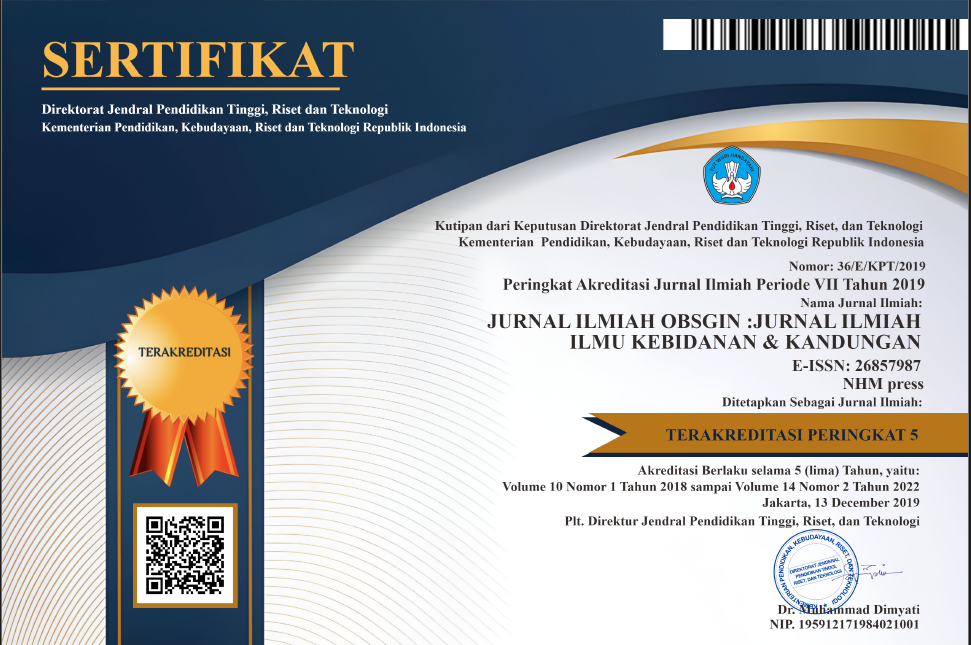Hubungan Dukungan Keluarga dengan Kepatuhan Ibu Hamil Melaksanakan Pemeriksaan Antenatal Care di Wilayah Kerja Ponkesdes Alun-Alun Lumajang
Abstract
Every pregnant woman will face risks that can threaten her life. Therefore, every pregnant woman needs care during her pregnancy through antenatal care checks. Family support is very important to prevent unwanted conditions such as risky pregnancies, and this can be achieved by fulfilling complete antenatal care visits. This study aims to determine the relationship between family support and the compliance of pregnant women in carrying out antenatal care examinations in the Ponkesdes Alun-Alun Lumajang This study was a correlational design with a cross sectional approach. The population in this study were all pregnant women in the Ponkesdes Alun- Alun involving 31 participants. The sampling technique was a simple random sampling. Data collected was a data collection sheet. Data were analyzed using Predictive Analytics SoftWare Version 18 with the spearman rho test at a significance level of <0.05. The results showed that pregnant women in the working area of Ponkesdes Alun-Alun Lumajang more than half (58.1%) received less family support and more than half (54.8%) had a low level of compliance of pregnant women in carrying out antenatal care examinations. The results of statistical analysis showed that there was a relationship between family support and the compliance of pregnant women in carrying out antenatal care examinations with a strong positive correlation level (p-value = 0.000 (α<0.05); r = 0.856). Family support forms a close relationship so that it can increase the satisfaction of pregnant women, and increase the ability of pregnant women to have a healthy pregnancy, and pregnant women with family dysfunction are more likely to be isolated and lead to negative attention.
References
Ali, Elbarazi, & Alabboud. (2020). Antenatal Care Initiation Among Pregnant Women in the United Arab Emirates: The Mutaba’ah Study. Frontiers in Public Health, 11(00211).
Ayuni, D. Q. (2020). Buku Ajar Asuhan Keperawatan Pada Pasien Post Operasi Katarak. Pustaka Galeri Mandiri.
Baghersad, & Mokhtari. (2019). Effect of Home Care on Husband’s Support During the Postpartum Period. Journal of Holistic Nursing and Midwifery, 29(4).
Battulaga, & Benjamin. (2021). The Impact of Social Support and Pregnancy on Subjective Well-Being: A Systematic Review. Frontiers in Psychology, 9(9).
Broeck, Feijen, & Putman. (2016). Antenatal care use in urban areas in two European countries: predisposing, enabling and pregnancy-related determinants in Belgium and the Netherlands. BMC Health Services Research, 16(337).
Chasanah. (2015). Peran petugas kesehatan masyarakat dalam upaya penurunan angka kematian ibu pasca MDGs 2015. Jurnal Kesehatan Masyarakat Andalas, 9(2).
Conger. (2020). Socioeconomic Status, Family Processes, and Individual Development. Journal of Marriage and The Family, 72(3).
Febriyani, & Medhyna. (2021). Asuhan Kebidanan Kehamilan Komprehensif. Yayasan Kita Menulis.
Fitrayeni, Suryati, & Faranti. (2015). Penyebab Rendahnya Kelengkapan Kunjungan Antenatal Care Ibu Hamil Di Wilayah Kerja Puskesmas Pegambiran. Jurnal Kesehatan Masyarakat Andalas, 10(1).
Gultom, & Hutabarat. (2020). Asuhan Kebidanan Kehamilan. Zifatama Publisher.
Kaakinen, Coehlo, Tabacco, Hanson, & Steel. (2015). Family Health Care Nursing Theory, Practice, and Research. F.A Davis Company.
Kementerian Kesehatan RI. (2020). Profil Kesehatan Indonesia Tahun 2019. Sekretariat Jenderal Kementerian Kesehatan RI.
Kim, Taylor, & Gutter. (2016). Extended Families: Support, Socialization, and Stress. Family and Consumers Science Journal, 1(1).
Kurniawan. (2017). Early Detection Of High Risk Pregnancy. JUrnal Kesehatan Masyarakat Kesmas, 12(2).
Mastiyas, Y. N. (2017). hubungan Resiliensi Keluarga dengan Kekambuhan Pada Orang Dengan Gangguan Jiwa. Fakultas Keperawatan Universitas Airlangga Surabaya. https://doi.org/10.1017/CBO9781107415324.004
Mullany. (2017). e impact of including husbands in antenatal health education services on maternal health practices in urban Nepal: results from a randomized controlled trial. Health Educ Res, 22(1).
Paul, Sikdar, & Mahanta. (2021). Peoples’ understanding, acceptance, and perceived challenges of vaccination against COVID-19: A cross-sectional study in Bangladesh. Plos One Journal, 16(8).
Sadock, B. J., Sadock, V. A., & Ruiz, P. (2017). Kaplan & Sadock’s Comprehensive Textbook Of Psychiatry Tenth Edition. Wolters Kluwer. https://doi.org/10.16309/j.cnki.issn.1007-1776.2003.03.004
Saifuddin. (2015). Buku Acuan Nasional Pelayanan Kesehatan Maternal dan Neonatal. Yayasan Bina Pustaka Sarwono Prawirohardjo.
Sari. (2015). Rujukan Kehamilan Berisiko di Rumah Sakit. Istana Publishing.
Sukartini, Khoirunisa, & Hidayati. (2019). Knowledge, Family And Social Support, Self Efficacy And Self-Care Behaviour In Pulmonary Tuberculosis Patients. Jurnal Keperawatan Soedirman, 14(2).
Tafere. (2018). Providers adherence to essential contents of antenatal care services increases birth weight in Bahir Dar City Administration, north West Ethiopia: a prospective follow up study. Reproductive Health, 15(163).
Triana, Damayanti, Afni, & Yanti. (2015). Buku Ajar Kebidanan Kegawatdaruratan Maternal dan Neonatal. Deepublish Publisher.
Wieler, & Roos. (2016). Teenage pregnancy: the impact of maternal adolescent childbearing and older sister’s teenage pregnancy on a younger sister. BMC Pregnancy and Childbirth, 16(120).
Wiradnyani. (2018). Role of family support and women’s knowledge on pregnancy-related risks in adherence to maternal iron–folic acid supplementation in Indonesia. Public Health Nutrition, 19(15).
World Health Organization. (2019). Maternal mortality, Evidence brief To improve maternal health, barriers that limit access to quality maternal health services must be identified and addressed at all levels of the health system. World Health Organization, 20(10).
Xuefeng. (2020). Family socioeconomic status and home-based parental involvement: A mediation analysis of parental attitudes and expectations. Children and Youth Services Review, 116(105111).
Yang, Kumar, & Cao. (2020). Social support and clinical improvement in COVID-19 positive patients in China. US National Library of Medicine National Institutes of Health, 68(6).












